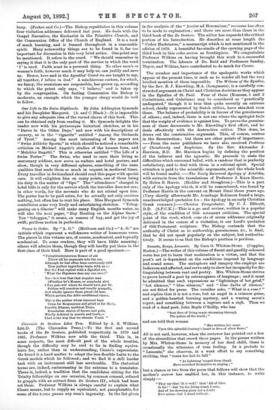Ciceronis de Gratore Libri Tres. Edited by A. S. Wilkins,
Litt.D. (The Clarendon Press.)—To the first and second books of the De Orators, published respectively in 1879 and 1881, Professor Wilkins now adds the third. This is, in some respects, the most difficult part of the whole treatise, though the difficulty may be said to lie in finding equiva- lents for, rather than in understanding, Cicero's expressions. He found it a hard matter to adapt the less flexible Latin to the Greek models which he followed and we find it a still harder task with an instrument still less serviceable. . The rhetorical terms are, indeed, embarrassing in the extreme to a translator. There is, indeed, a tradition that the candidates sitting for the Trinity fellowships on one occasion, by common consent, refused to grapple with an extract from De Orator, III., which had been set them. Professor Wilkins is always careful to explain what Cicero means, but to supply an equivalent, not paraphrastic, for some of the ttrzns passes any man's ingenuity. In the list given in the analysis of the " Auctor ad Herennium," recourse has often to be made to explanation ; and there are more than these in the third book of the De Orators. The editor has expanded the critical portion of his Introduction. He describes at some length the "Codex Harleianias," a manuscript which is not mentioned in the edition of 1879. A beautiful fac-simile of the opening page of the third book in this codex serves as frontispiece. We congratulate Professor Wilkins on having brought this work to a suceessful termination. The labours of Dr. Reid and Professors Sanday, Mayor, and Wilkins, have contributed to do much for Cicero.


































 Previous page
Previous page